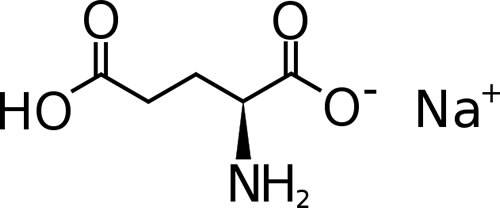"Monosodium glutamate, or MSG, is a widely used flavor enhancer. It is said to add a 5th flavor to foods, a savoury taste, adding onto the four basic tastes (salt, sweet, sour and bitter). It has many names, ranging from accent and vetsin to ajinomoto. What is so curious about MSG is that it does not act by adding a specific taste of its own (as does salt or sugar), but instead it seems to serve as a stimulant which increases the sensitivity of taste receptors thus "multiplying" the taste of foods.
accent and vetsin to ajinomoto. What is so curious about MSG is that it does not act by adding a specific taste of its own (as does salt or sugar), but instead it seems to serve as a stimulant which increases the sensitivity of taste receptors thus "multiplying" the taste of foods.
MSG is the sodium salt of the amino acid glutamic acid. In aqueous solution, the acid reverts to its ionised form, and is known simply as glutamate. Glutamate plays a pivotal role in the biosynthesis of several key amino acids, and in fact, most of the non-essential amino acids (such as alanine and aspartine) derive their α-amino groups from glutamate. Glutamates are found naturally occuring in many fruits and vegetables, for example tomatoes, as well as many of the meats we consume (animal proteins contain between 11% and 22% of glutamic acid by weight)."